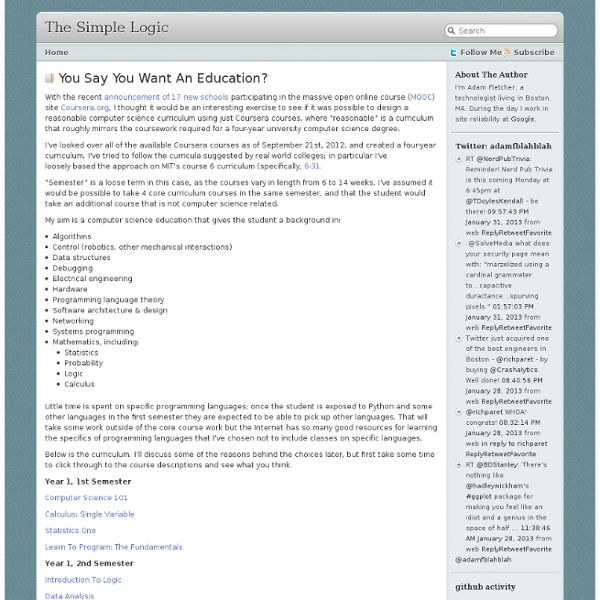The Simple Logic » Blog Archive » You Say You Want An Education?

What Is Education For?
We are accustomed to thinking of learning as good in and of itself. But as environmental educator David Orr reminds us, our education up till now has in some ways created a monster. This essay is adapted from his commencement address to the graduating class of 1990 at Arkansas College. It prompted many in our office to wonder why such speeches are made at the end, rather than the beginning, of the collegiate experience. David Orr is the founder of the Meadowcreek Project, an environmental education center in Fox, AR, and is currently on the faculty of Oberlin College in Ohio. If today is a typical day on planet Earth, we will lose 116 square miles of rainforest, or about an acre a second. The truth is that many things on which your future health and prosperity depend are in dire jeopardy: climate stability, the resilience and productivity of natural systems, the beauty of the natural world, and biological diversity. It is worth noting that this is not the work of ignorant people.
Peer-to-Peer Learning Handbook | Peeragogy.org
Liberate Education: How to Start a Free School
This how-to guide was written for Shareable by organizers (especially Aaron Rosenblum) from EXCOtc, a collective of Experimental Colleges in the Twin Cities of Minnesota that share a visions of a better world, offering free and open classes, and building a community around education for social change. EXCO-TC began eight years ago and is now made up of three collaborating local organizing chapters: Macalester/St. Paul, the U of M, and the Academia Communitaria. The Free Schooling Movement The origin of free schools (or free skools) in the United States can be traced back to 1911 when the first Modern School opened in New York City’s Lower East Side. Inspired by the work of Francesco Ferrer and La Escuela Moderna in Catalonia, Spain, a group of NYC-based anarchists opened their school embracing an alternative learning model for youth and adults based on academic freedom, democratic organization, and socially conscious education. Don’t see your town on the map? People Community Resources
freeskoolsproject
Related:
Related:



